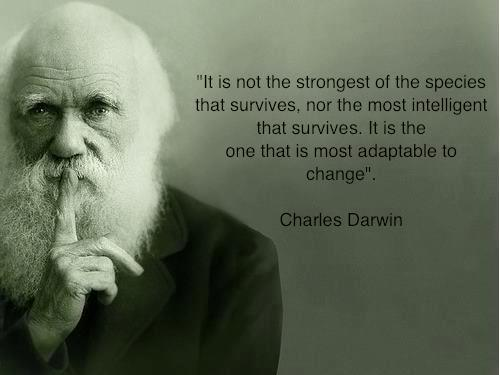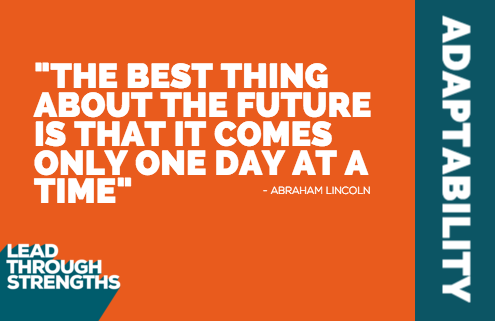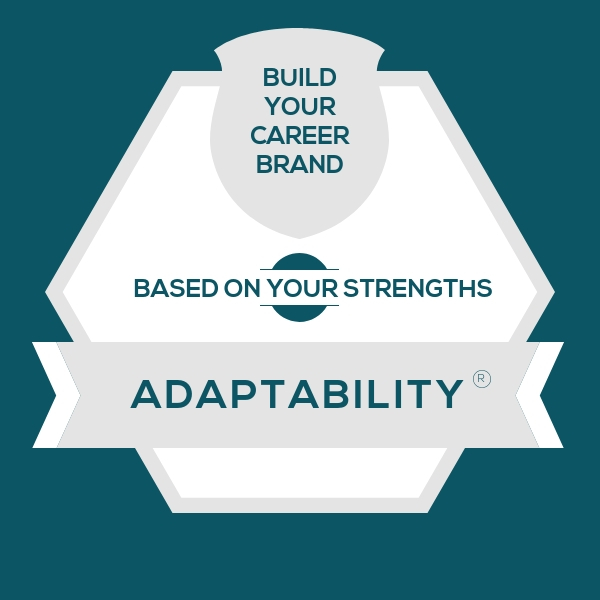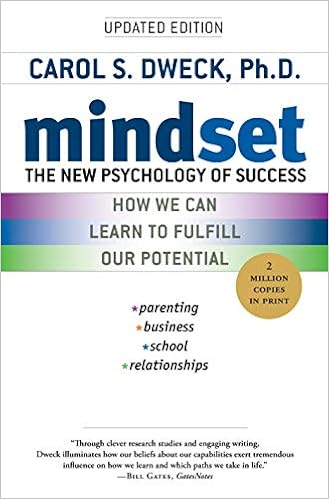People strong in Strengthsfinder Adaptability have the innate ability to switch direction quickly with little or no stress.
You can tell a person strong in Adaptability by these attributes (source: Dr. Hulme, APU)
- Live in the here and now
- Have great focus and energy in the moment of need
- Adjust easily
- Go with the flow
- Handle the unexpected well
More about Adaptability:
-
- Needs on a team: Flexibility
- As a Leader: Live in the moment
- In Conflict: Go with the Flow
- Partner with:
- In academics:
– loves flexibility — needs to explore lots of options before choosing a major – work hard to help the student see how various course choices could be used to fit any major or to meet graduation requirements – flexibility is the key! – these students will tend to add/drop more than the usual student, so allow them to register for more courses than they intend to take, knowing they will drop the ones that don’t interest them – remind them of the drop/add deadline

Where does Adaptability Theme rank in the population?
- Overall, Adaptability ranks 10th, occurring in around 16% of the population’s Top Five (17% of Females and 17% of Males)
13 |
|
3 |
10 |
Out of your Top 5 CliftonStrengths, it’s statistically:
- most likely to appear with Empathy and Harmony
- least likely to be found with Focus and Discipline
The genius of your Empathy talent involves your ability to form high quality, deep,personal understanding and relationships with others. You have an unusual and beautiful ability to feel into what it feels like to be another person You can often feel what someone else feels without them saying a word. As a result, you can form very close,intimate relationships with people. The genius of Empathy has profound effects on others because they feel so deeply understood. Many people feel like they come healthier and more at peace being in your presence because your understanding of people goes beyond the words they can find to express themselves. While it may be hard on you to hear the pain of others, they will feel deeply indebted to you because you can understand them at such profound levels. The genius of Empathy makes you a great lover of other people and they are fortunate to have you as a friend.

At your best (Balcony):
-
flexible, comfortable in times of change, easy to get along with, goes with the flow
At your worst (Basement):
-
directionless, indecisive, sheep, inconclusive, whimsical
Adaptability may be one of your signature themes if…
- You live in the moment and enjoy sudden requests or detours from your current plans.
- You view the future as dynamic, ever-changing, and a culmination of choices you make.
- You are opportunistic, looking for the best plans, even if you made prior engagements.
- You see change and broken engagements as inevitable facts of life and do not resent them.
- You are extremely flexible and find productivity, even when you are pulled in all directions.
- Source: Let’s Talk Personality
A more detailed explanation from Gallup:
You live in the moment. You don’t see the future as a fixed destination. Instead, you see it as a place that you create out of the choices that you make right now. And so you discover your future one choice at a time. This doesn’t mean that you don’t have plans. You probably do. But this theme of Adaptability does enable you to respond willingly to the demands of the moment even if they pull you away from your plans. Unlike some, you don’t resent sudden requests or unforeseen detours. You expect them. They are inevitable. Indeed, on some level you actually look forward to them. You are, at heart, a very flexible person who can stay productive when the demands of work are pulling you in many different directions at once.
Action Items for This Theme
- Seek roles in which success depends upon responding to constantly changing circumstances. Consider career areas such as journalism, live television production, emergency healthcare, and customer service. In roles of this type, the best react the fastest and stay level headed.
- Fine-tune your responsiveness. For example, if your job demands unanticipated travel, learn how to pack and leave in 30 minutes. If your work pressure comes in unpredictable spurts, practice the first three moves you will always make when the pressure hits.
- During times when the pressure is on, help your colleagues find productive ways to relieve the pressure and therefore make progress. You can be the spark that “unfreezes” them.
- Cultivate your reputation as a calm and reassuring person when others become upset by daily events.
- Never apologize for your spontaneity. On the contrary, help others realize how many experiences might be missed if you don’t seize the moment now.
Be ready to:
- Avoid roles that demand structure and predictability. These roles will quickly frustrate you, make you feel inadequate, and stifle your independence.
Look to others for planning. People who strong in themes such as Focus, Strategic, or - Belief can help you shape your longer-term goals, leaving you to excel at dealing with the day-to-day variations.
- The Clifton StrengthsFinder and the 34 Clifton StrengthsFinder theme names are protected by copyright of Gallup Inc., 2000. All rights reserved.
For the more visually inclined:
A fantastic website with insightful discussion of Adaptability, including
 Building your brand through this strengths
Building your brand through this strengths- Strengthening your performance at work
- Tips for managing someone with this strengths
- Partnering with someone with this strength

 Adaptability Power and Edge takes an interesting approach highlight not just what the strength is and how it shows up if you have it in your top five, but also how to navigate the world when this strengths is one of your lesser ones.
Adaptability Power and Edge takes an interesting approach highlight not just what the strength is and how it shows up if you have it in your top five, but also how to navigate the world when this strengths is one of your lesser ones.
More ideas on going deeper:
- Gallup on How You Can Productively Aim Your Adaptability Talents
- Many universities use the StrengthsQuest Workbook to help you build relationships, more effectively study and find meaning in what you do.
- South Mountain Community College offers up ideas on Applying your Talents in Career Discovery and Applying your Talents in Academics
- Western Texas tells us about Using your Strengths In the Job Search, Interview and New Position
- Weber State University has posted action plan worksheets for each of Gallup’s 34 strengthsfinder talents.
 From Lead Through Strengths listen/read:
From Lead Through Strengths listen/read:
Career Branding When Adaptability Is Your Strength includes an audio file exploring:
1. Career Branding
2. Red Flag Situations At Work
3. Fresh Application Ideas
View this post on Instagram
THEME INSIGHTS:
- I am (Belong) ———-> A Here-And-Now Person
- I will (Doing) ———-> React With Immediacy To the Immediate
- I Bring (Contribution) ———-> A Willingness To Follow The Lead Of Change
- I need (Requirement) ———-> Present Pressures That Demand An Immediate Response
- I love (Value) —————> Spontaneity
- I Hate (Value) —————> Predictability
- Metaphor/Image ———-> Like A River, Go With The Flow
- Barrier Label ———-> Directionless
THEME CONTRAST:
- ADAPTABILITY: I like it when every day is different.
- DISCIPLINE: I like it when every day is the same————————————————————————————————–
- ADAPTABILITY: Responds to change in an environment
- ARRANGER: Initiates or manages changes in an environment

- Mastery Monday: Understanding Adaptability
- Mastery Monday: Productive Aiming: Adaptability (2018)
- Highly recommended: Utilize the Called to Coach worksheet for Adaptability as you listen.

The basic premise of the book is “The reason that the the greatest leaders and people are successful is because they have a Mindset focused on growth.” In a nutshell, succesesful people believe that they can grow into being smarter, talented, and better. What’s more, they constantly look for opportunities to do so.
 Who moved my Cheese? asks the all powerful question that the adaptable people of the world usually answer with Who cares! Let’s go explore.
Who moved my Cheese? asks the all powerful question that the adaptable people of the world usually answer with Who cares! Let’s go explore.

In this groundbreaking book, Tim Harford shows us a new and inspiring approach to solving the most pressing problems in our lives. Harford argues that today’s challenges simply cannot be tackled with ready-made solutions and expert opinions; the world has become far too unpredictable and profoundly complex. Instead, we must adapt—improvise rather than plan, work from the bottom up rather than the top down, and take baby steps rather than great leaps forward.
Podcast episodes to help you understand and leverage your Adaptability Strength
- Episode 1: Embracing Change and Uncertainty – “The School of Greatness with Lewis Howes”
- Episode 2: Strategies for Flexibility and Agility – “The Tony Robbins Podcast”
- Episode 3: Thriving in Dynamic Environments – “The GaryVee Audio Experience”
- Episode 4: Adapting to New Situations – “The Art of Charm”
- Episode 5: Navigating Turbulent Times with Resilience – “The Resilient Podcast”
- Episode 6: Women Leaders Navigating Change with Resilience – “The Confident Woman Podcast” (Host: Sherry Parks)
- Episode 7: The Adaptable Woman: Thriving in Uncertain Times – “Women Who Lead” (Host: Andrena Sawyer)
- Episode 8: Women Who Embrace Adaptability in Leadership – “The Female CEO” (Host: Stacey Sargison)
Listen to great Strengths Podcasts
- Theme addicts is a series created by UnleashStrengths to highlight the massive impact the StrengthsFinder assessment through interviews and discussions.
- Lead through your strengths features many interesting guests and Career Q and A about leverage your strengths at work.
- Maximize Your Strengths features interviews and discussion on developing your strengths. She really drills into each of the themes by interviewing real people on how a specific theme shows up in their lives.
- Called to Coach is a webcast resource for those who want to help others discover and use their strengths. We have Gallup experts and independent strengths coaches share tactics, insights and strategies to help coaches maximize the talent of individuals, teams and organizations around the world.
- ISOGO TV promises a lot: So dramatically increase your energy and decrease your frustration at work, that you cannot help but take the Strengths paradigm home to your family. Fueling life-changing stories.
- The True Strength Podcast by Ian Pettigrew (Kingfisher Coaching) features inspiring true stories of how people succeed through applying their strengths and being resilient. It often includes a Gallup StrengthsFinder profile.
- If you are looking to identify and develop your strengths and talents, take calculated risks and make decisions, The Strengths Revolution with Steve Morgan will help your personal development, as well as helping you support your clients, employees, teams and wider organisations. Knowing your strengths will also support positive risk-taking and decision making as part of good risk management.
 Sources:
Sources:
- Balconies and Basements
- Leadership, team and conflict
- The Genius and Beauty of Strengths
- Strengths-based academic Advising
- Strengths partnerships
- Clifton Strengths Power and Edge







